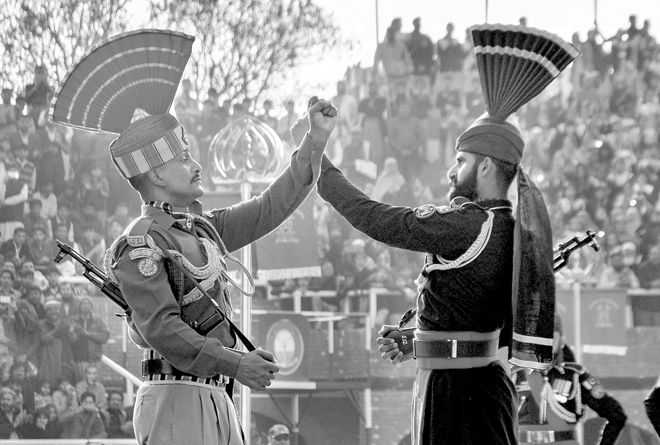The uncomplicated reality is that the rivalry between Indians and Pakistanis arises not so much from being different, but from being similar

Rahul Bedi
The fierce rivalry between India and Pakistan extends beyond incipient war, military stand-offs, cross-border terrorism, diplomatic demarches and all-round bellicosity to the daily life of people on both sides of the volatile border. It stretches beyond conducting tit-for-tat underground nuclear tests — Pakistan undertook six to India’s five in May 1998 — acquiring better materiel and battling military and political comeuppances, to competitiveness in everyday life.
Each country’s people claim to grow sweeter mangoes, melons and grapes than the other, produce better music, singers and television programmes, and even entertain and dress better and keep a more lavish table than those across the border.
Pakistanis are convinced — some believe with demonstrable justification — that their women are more attractive than their Indian counterparts, and their men folk are brimming with rakishness, charm and chutzpah. They also pride themselves with a keener sense of humour, higher intellect and finer sense of tehzeeb than most Indians. Both sides also believe their sporting prowess in cricket and hockey, which India and Pakistan had played with dexterity as one before Independence from colonial rule, is superior to the other. Cricket matches between the neighbours are particularly tense events, as the losing side faces the ire of millions of fans in either country, which, over years, has often turned nasty for the losing team returning home. The victorious cricketing or hockey side, on the other hand, is lauded and lavished with accolades and financial rewards for having bested the ‘enemy’.
The uncomplicated reality, however, is that the rivalry between Indians and Pakistanis arises not so much from being different, but from being similar. This, in turn, locks them into an unending competitive cycle to outdo one another in all spheres in order to feel superior. However, one domain in which most Pakistanis willingly, but grudgingly concede to Indian supremacy is Bollywood. They reluctantly acknowledge that Lollywood, Pakistan’s nascent film industry, based out of Lahore that gives it its name, is what it really is: a deprived Bollywood imitation. But they reassure themselves by pointing out that, for decades, a majority of Bollywood icons have been Muslims like Dilip Kumar, Shah Rukh Khan, Salman Khan, Amjad Khan and Aamir Khan. Muslim Bollywood actresses like Katrina Kaif and Shabana Azmi, too, are household names in Pakistan.
The competitiveness between India and Pakistan, however, manifests itself daily like nothing else at Wagah, when impeccably turned out border guards lower their respective flags at the sunset. Specially trained Indian Border Security Force personnel, selected for their height, fierce moustaches and military bearing, and similarly recruited Pakistan Rangers try and outdo one another in starched uniforms, marching, pirouetting and screaming ear-splitting commands, as they go about their flag lowering. The spectacular theatrics that take place in amphitheatre-like surroundings, backed by robust commentary and patriotic songs, are cheered by thousands of spectators on either side of the frontier. Over the years, these daily performances have become hugely popular and rated high on the tourist circuit.
After the border gates are closed at the sunset, Pakistanis and Indians, separated by a few hundred yards of no-man’s land, shout out to each other extolling the performance of their border guards as well as their overall superiority. At times, this desire for one-upmanship reaches ridiculous, and often wily, but sardonic heights.
During the 2001 bilateral summit in Agra, former Pakistan President Pervez Musharraf was assigned, in keeping with protocol, an unusually tall Indian Air Force officer as his ceremonial aide de camp. The Indian motive was simple but crafty: it would compel the visiting leader, that too a soldier, to look up to the Indian military man.
In February the nuclear-armed neighbours, who have fought four wars since Independence, came close to another conflict after an Indian combat aircraft bombed an alleged Islamist groups training camp inside Pakistan. India was retaliating against the Jaish-e-Mohammad after it owned responsibility for the suicide bombing that killed over 40 paramilitary personnel in Pulwama a fortnight earlier. The Indian strike prompted a riposte from Pakistan, which led to a dogfight between the two air forces on February 27 over the Line of Control.
Expectedly, Delhi and Islamabad made competing claims regarding their military successes, categorically rubbishing the others assertions with disdain, each side rabidly convinced of their righteousness.
